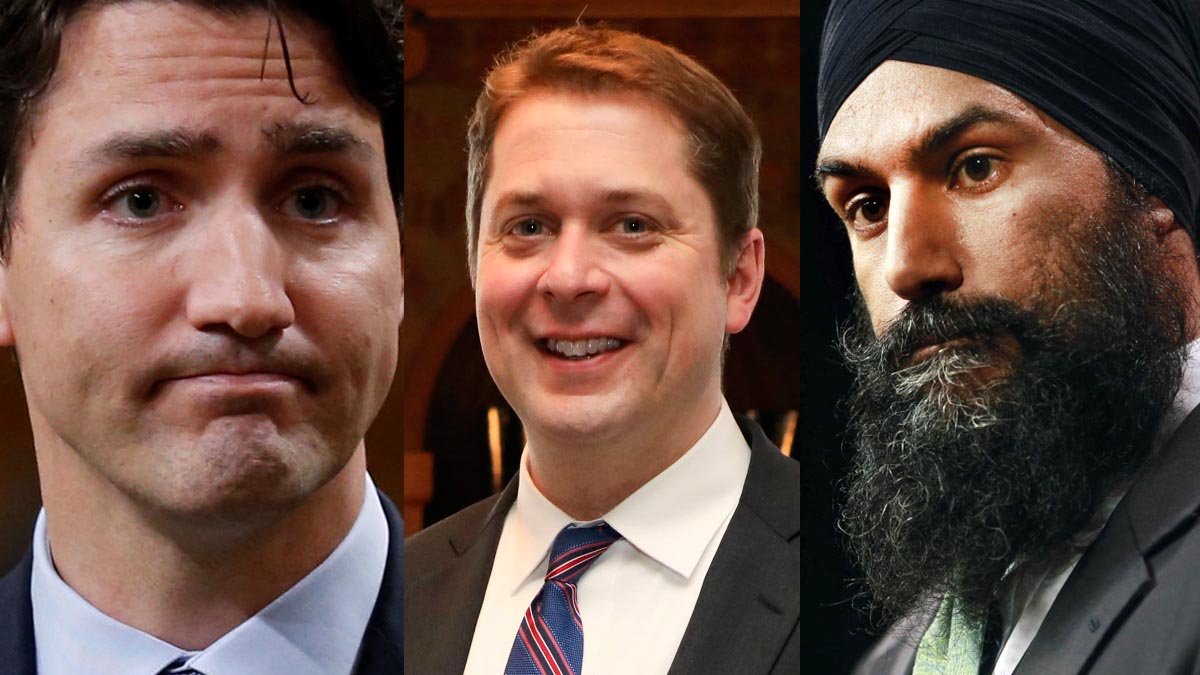As I’ve already written, the left’s “golden trio” – Jacinda Ardern, Emmanuel Macron and Justin Trudeau – are sinking deeper into the electoral doo-doo. Despite endless media fluffing, voters are becoming increasingly aware of the yawning void between spin and reality. France has been wracked by a popular revolt, while Ardern’s popularity is steadily sinking. Justin Trudeau faces Canadian voters in a week – and it’s not looking good.
But as Trudeau’s sparkle fades, will that be enough to deliver government to Andrew Scheer’s Conservatives? As has happened across the West, voters are abandoning traditional, two-party rivals in favour of minor parties.
It appears Canadians paid close attention to the leaders’ debates. In the past two weeks, pollsters have measured two distinct movements in voting intentions in the country:
First, in the days that followed the first French debate on the TVA network, Conservatives have dropped 5 to 7 points in [Quebec] on average—basically rendering their chances of net gains in Quebec next to zero. Diametrically, the Bloc Québécois has gone from polling in the high teens to the high 20s over the same period—some polls have even placed the Bloc above the 30 per cent…the question in Quebec is whether the Bloc can overtake the Liberals in first place.
Well, you might say, that’s the Quebecois for you. But elsewhere in Canada, the social democrat NDP are benefitting from the collapse of the Liberal vote, and the strong performance of leader Jagmeet Singh.
Five polls published after the debates measured NDP support between 17 and 20 per cent nationally—significantly better than last week’s average of 14 per cent. In the latest poll from Abacus Data, Jagmeet Singh’s positive impression rating has jumped a staggering 10 points (from 31 to 41 per cent) since late September.
So where does that leave the likely election result, next week?
The Conservatives and Liberals remain in a statistical tie in the popular vote projection again this week with the slightest of edges going to the Tories. However, it is important to note that both parties have shed support since the commission debates:
Indeed, both the Liberals and Conservatives were hovering around the 34 to 35 per cent mark before the debates. The Conservatives’ average now stands at 33 per cent and the Liberals’, 31 per cent. Meanwhile, the NDP, whose average stood at barely 11 per cent two weeks ago has been gaining support and now stands at an average of 16 per cent nationally.
The NDP gaining support in both Ontario and British Columbia and the Bloc regaining relevance in Quebec must be what Liberal nightmares are made of. While the Conservative base of 31 to 33 per cent appears rock solid, all these numbers indicate that the 2015 Trudeau coalition may be falling apart.
What’s significant is the huge numbers of undecided voters and the likelihood of a minority government.
No fewer than 139 of 338 electoral districts labeled as either “toss up” or “leaning”—meaning more than a third of all ridings remain too close to call…since both parties’ averages stand below 140 seats, it means that, according to current numbers, the probability of a majority government have decreased significantly. A “weak minority” scenario, with both the Liberals and Conservatives below 140 seats (and where not a single party holds the balance of power) appears to be more and more plausible…
Should the Bloc Québécois and the NDP keep increasing their support over the next seven days, it will most likely hurt the Liberal seat projection more than the Conservatives’. Hence, Andrew Scheer could become Canada’s 24th Prime Minister…
… should he and his Conservative MPs manage to win confidence of the House, which will be no small feat.
macleans.ca/politics/ottawa/this-weeks-338canada-projection-prime-minister-andrew-scheer/
It would seem natural for the NDP to ally with the Liberals; however, both parties are pooh-poohing the idea. The NDP has particularly walked back on the idea. This seems likely because Canadians seem averse to the idea of coalition governments: especially a Liberal/NDP/Green coalition. Indeed, Conservative leader Scheer has hammered home the spectre of a “reckless, tax-and-spend” left-wing coalition.
If the Bloc sweep the Francophone electoral districts, they could well end up being the wild card in a deeply polarised election.

